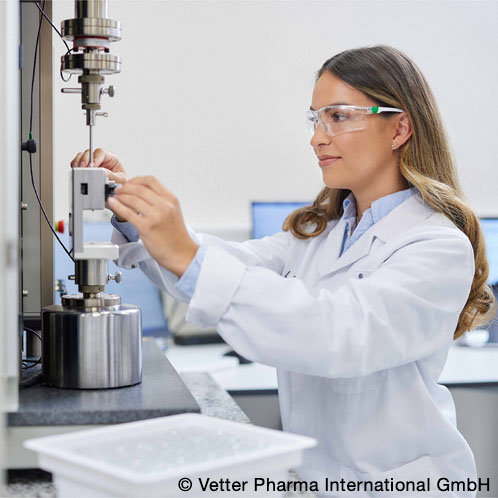Drug owners are looking to improve their supply chain strategies and, as a result, companies supporting those biopharma enterprises need to adapt to these shifting requirements to remain one step ahead of the competition.
Leading contract development and manufacturing organisations (CDMOs) are consistently enhancing their commitment to customer partnerships with strategic investments to meet evolving market demands.
At Vetter, explains Managing Director, Thomas Otto, we are committed to meeting these needs with the by establishing a cutting-edge aseptic production site housing several cleanrooms.
This is reflected in a forward-thinking approach, which aligns with the broader industry trend of a compound annual growth rate (CAGR) of 5–8% in global spending and demand for medicines until 2028, which increased by 2 percentage points compared with previous forecasts according to the IQVIA Institute for Human Data Science Analysis.
This pledge to invest underscores a commitment to sustainable growth. Although costs are increasing, strategic decisions are required to maintain a competitive edge and uphold the highest possible quality standards in aseptic fill-finish and packaging services.
Outsourcing partners that invest throughout the value chain will be best positioned to be successful in the future.
This includes contributing to reliable supply chains and providing advanced infrastructure, efficient processes and sustainable business practices that bring a customer drug product to market as fast as possible … and support the commercial customer needs of today and tomorrow.
As CDMOs look to meet rapidly evolving client needs, the following areas of focus should remain a priority.

Reliable supply chains
In an industry in which speed can be a matter of life and death, disruptions in the supply chain can have severe consequences. Solution providers with a specialised focus on development and manufacturing offer a level of expertise and reliability that can be challenging to replicate in-house.
This service portfolio is instrumental when navigating global challenges — such as the recent pandemic — and fulfilling commitments to being robust and reliable partners on a global level.
In the future, strategic and collaborative partnerships between biopharma companies and their outsourcing partners will be of increased importance.
CDMOs must move away from being simple “executing and delivering” service providers and establish eye-level relationships with common goals and shared values to get life-saving medications to patients around the world.
We are relying more than ever on the expertise and foresight of purchasing, sales and operations planning processes. These teams have always played a key role in balancing cost containment and resource availability.
Today, they’re of the utmost importance owing to their participation in supplier negotiation and enabling strategies, internal collaborations with sales and financial control, and their ability to navigate changing market demands.
As communication and data exchange become increasingly digital, pharma and biotech companies will continue to rely on partners who are implementing robust cybersecurity measures to protect sensitive information.
Those suppliers of choice will maintain trust and support the integrity of the entire supply chain without compromising quality.
Technologically advanced infrastructure
Staying technologically competitive is a major demand for pharma and biotech companies. Investing in cutting-edge infrastructure requires substantial capital and ongoing commitment, not to mention a high level of expertise to effectively leverage those capabilities.
CDMOs, as specialists, can concentrate their resources on staying at the forefront of technological advancements in their niche — such as highly specific development, manufacturing and packaging processes — in addition to being able to offer them to a wide customer base.
Technologies such as artificial intelligence (AI), virtual reality (VR) and autonomous collaborative robots are the tools driving this transformation. Robots, for example, are already widely used in pharmaceutical cleanrooms … and the trend is only growing.
The global market for cleanroom robots is estimated to grow from $6.4 billion in 2022 to $25.6 billion in 2030, according to a report by Research & Markets.1
As a result, it is expected that there will be a continued and even heightened use of collaborative robots that work alongside human counterparts. Robots such as YuMi can be “trained” by an employee to independently perform a series of “learned” steps, freeing up the operator to work on more individual projects.
The result is the use of digitalisation to reduce the workload and expand the overall output.
These technologies increase efficiency and shorten production times. They also enable more sophisticated data analysis that can drive innovation in drug development and manufacturing processes.
The most forward-thinking outsourcing partners are at the forefront of digital transformation; they’re leveraging technology to enhance customer service by providing operational efficiencies.
This approach is important to drive the timely delivery of life-saving therapeutics and meet customer requirements. Moreover, it offers a cost-effective solution for sponsors by eliminating the need to invest in expensive technologies that may apply only to a small number of their drug products.
By partnering, biopharma companies can broaden their access to technological advancements that are tailored to the specific requirements of a drug product, especially when it comes to sensitive biologics, optimising both efficiency and financial resources.
Proven processes for speed and efficiency
The key driver in the development and manufacture of life-saving medicines is the efficiency gained through process knowledge. Time to market is critical in the pharma and biotech industry.
Outsourcing partners are engaged to streamline the manufacturing process and offer proven methodologies that enable efficient development while maintaining the highest possible quality.
Drug developers face intense competition, regulatory pressure and the constant need to address unmet patient needs. Notably, there's a growing trend in simultaneous blockbuster and small-batch manufacturing, particularly in response to heightened research into rare disease treatments.
Our company is meeting these emerging demands and contributing to more targeted and specialised drug development and manufacturing efforts to fulfil these needs.
Companies that adopt advanced digital processes, behaviours, and technologies can strengthen their leadership position while becoming more globally competitive.

We are investing €1.5 during the next decade to increase our development and manufacturing capacities and the optimise our infrastructure to further develop processes.
Sustainable business practices
The trend toward sustainable and ecofriendly practices is no longer an ethical choice; it’s a fundamental expectation shaping the future of aseptic fill-finish.
The industry is recognising the importance of reducing its environmental footprint and addressing concerns about resource depletion, pollution and climate change. This emphasis is a response to societal expectations and a strategic move to futureproof operations.
Besides their commitment to reducing their carbon footprint, customers are now extending their scrutiny to include the sustainability initiatives of their partners. Alignment with the goals and objectives set by customers is paramount.
As a service provider, associating with these values and visions puts you ahead of the curve and differentiates you from competitors who are slower to adopt sustainable practices.
We are continuously meeting these challenges with success that has earned our company a role in the Science Based Target Initiatives (SBTi), participation in the UN Global Compact and a platinum ranking from EcoVadis.2
Today, our sustainability programme focuses on three pillars (economy, ecology and social impact) and progress is tracked in an annual sustainability report.
To operate in a highly competitive industry wherein customers balance the sustainability level of different potential partners as an important criterion for outsourcing decisions, we need to achieve ambitious goals to demonstrate this commitment to both existing and potential clients.
Sustainability might well be the reason why a CDMO wins a new partnership. Therefore, they need to prioritise being planet friendly to remain competitive.
Looking ahead
Biopharmaceutical companies are looking for third-party experts to do more than fill an in-house skills gap or enable an internal team to focus on core competencies.
Rather, they are increasingly looking for partners that offer a strategic, value-added mix of specialised services, flexible and customised solutions, and efficient operations that span as much of the value chain as possible.
In response, there is a trend to actively pursue new partnerships, especially between manufacturers with complementary specialties or additive capabilities. The goal is to synchronise expertise in a way that shortens time-to-market, accelerates technological advances and delivers significant long-term value to customers.
As the industry navigates uncertainties, outsourcing partners need to invest in the future of contract manufacturing to stay ahead of the game. This investment will be followed a rising number of drug owners who will lean on CDMOs to ensure a competitive advantage.
References
- www.researchandmarkets.com/reports/5639896/global-clean-room-robot-market-by-type.
- www.vetter-pharma.com/en/news/vetter-joins-science-based-targets-initiative-sbti/.

